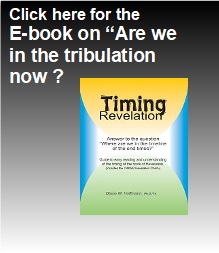Our Bible History, Part 3
Transcript from show #271.
(Please note that the transcripts are written pretty well as they were delivered on air).
Continuing on the prophecies toward the end time events of the book of Revelation, here's the transcript of another radio show from the Virtual Church for the Spiritual Unchurched, made available on the web site TimingRevelation.com
Every once in a while I like to review where our Bible came from, so that we don't forget the history behind it, and so that we continue to appreciate -- or for some of us -- begin to appreciate, the background of this wonderful Word of God that we are so privileged to have still today.
I am reminded of an article I wrote many years ago about the various translations of the Bible that began shortly after the king James Bible.
These
Bible translations are actually what brings us back to the 17th
century when the King James was written in order to bring everybody
to one common book that could be read together by all Christians,
because at that time there were already various Bibles written by
various authors.

Radio Show Opening Narrative
So today I will pick up from last week’s program of the history of our English Bibles…
I didn’t think this message would stretch out to 3 parts, but it is a long and fascinating transition from the original Hebrew and Greek Bibles to the translation and production of our English Bibles that we read today.
As I have already mentioned in the two previous parts of this study, there were only a few people who wrote the Bible in the original language from about the 1400’s BC to the 1st century A.D.
A lot of people misunderstand this difference from the original writers to the later translators of the Bible. In other words the Bible was not written by many men but by only a few.
Again as I explained before you don’t have to have heard a previous message in order to understand a current one… every message from these programs stand on it’s own…
...however in this case I do encourage anyone who has not heard parts 1 & 2 to go to the web site to get the link to the replays because there is so much informative development that lead us to really and truly appreciate what we have in our hands today as the Word of God in our English language – and other languages as well of course… but especially the English language and history crossing the political, economic, social and religious background.
The web site address to access the replays will be mentioned at the end of this program…
And as I also mentioned, this is only a tiny overview of the whole construct of this history which is all part of God’s history – His Story – the history of God’s Word… which permeates all of history--from beginning to end literally-- but it is intended to give us an understanding of what it took to bring us the English Bible and give us a much deeper appreciation whenever we read it.
I want to also remind you that the replays are up for about 5 weeks, so don’t wait too long, do it now so that you don’t forget about these important programs.
So right now let’s open the service with an uplifting good old country song…
Opening Music
... and this was a medley of "Set Your Fields on Fire, "Keep On The Firing Line and "Blessed Jesus Hld My Hand"… this should light your fire on this wonderful day.
Let us go to the Lord in prayer…
Let us say the Lord’s prayer together…
Let us sing the Praise God Doxology together…
Worship Music… and this was “Change my heart oh Lord” from a CD “Power Praise” Kingsway Music.
Narrative #1
So, picking up from my opening remarks and from where I left off in the last program,
1563
The thirty-nine articles of Religion was issued under Elizabeth I.
This was a cautious compromise between the various religious factions within England at the time.
Elizabeth argued: “there is only one Jesus Christ and all the rest is a dispute over trifles.
In the same year – Whittingham had been appointed dean of Durham, a cathedral city in the North of England.
He attempted to introduce the radical Protestantism he knew from Geneva, to this conservative northern cathedral but was met with resistance and controversy. This created great resistance and controversy so that the archbishop of York eventually felt to intervene by removing Whittingham. However Whittingham would eventually die before that took place.
1564
John Calvin died in Geneva.
1565, 1566, 1568
A letter to William Cecil (who became Elisabeth’s secretary of state at one point, from Matthew Parker The archbishop of Canterbury commented negatively on the Geneva version of the existing Bible, and produced a translation based on the Great Bible (which was the Matthew’s translation by Coverdale), which would be more acceptable by the authorities of the church.
Parker wrote Elizabeth I, complaining bitterly about “the diverse damaging notes” in his view, of earlier translations – referring to the notes of the Geneva Bible.
…but the critics of Parker and the reading public appreciated the Geneva Bible.
So, official opposition to the Geneva Bible could not prevent it from becoming the most widely read Bible of the Elizabethan and Jacobian era.
The Bishop’s Bible of 1568 was the officially approved translation.
During all this time there was still conflicts as to the official authorization of transient Bibles in England. There was a professional guild that controlled the publishing of manuscripts.
Matthew Parker was able to block any efforts to print the Geneva Bible.
…however, after his death, important consequences took place for the monopoly on Bible productions.
1575, 1578, 1579
Christopher Barker had produced a version of the Geneva Bible.
Two years later on the death of the previous publisher, the monopoly of printing an accepted bible version passed to Christopher Barker.
The first composite version of the Geneva Bible from Barker with modifications took place in 1578 – the translation of the N.T. was based on Laurence Tomson who was a member of the English community of the Marian exiles.
During this time Archbishop of York was forced to intervene in the controversies of Whittingham over his radical Protestantism promotion.
But a year later, Whittingham died.
From that time on, anything that might destabilize the Elizabethan balance was vigorously resisted by the church establishment.
There was great anxiety over the growing influence of the Geneva Bible.
Music... and this was a great rendering of “Thy Word is a lamp unto my feet” from a YouTube video but I do not have the name of the singer… the hymn is based on Psalm 119 and was adapted by Ernest O. Sellers, 1869-1952.
Narrative #2
In spite of the great anxiety over the growing influence of the Geneva Bible – because it was the favourite of the English people -- between 1583 and 1603 – Fifty-eight editions of the Bible were published in England – 7 of the Bishop’s Bible and 51 of the Geneva edition. …further details.
Many editions followed over these years.
1600
By 1600 the Geneva Bible had become the Bible of choice of English-speaking Protestants.
John Knox the moving influence of the Scottish Reformation pressed for the introduction of the Geneva Bible as the authorized version of the Reformed church of Scotland.
England was a Protestant nation and the Geneva Bible was its sacred book.
England’s greatest living playwright, William Shakespeare made use of the Geneva Bible in his dramas, rather than the official translations urged on the English people by the church authorities .
Oxford had not been interested in translating the Bible into English because they accepted Latin which as the only language of the culture of academia.
Tyndale had been with Luther’s agenda, to provide a translation for the common man, rather than with the scholarly attitudes encountered in English academia… .
However, there was a further factor that contributed to the growing prestige of the English language—and that was, The Reformation.
At the beginning of the 1600’s, Both Oxford and Cambridge were able to supply King James I with a plentiful supply of Greek and Hebrew .
1603
Elizabeth I died. She left a nation that had been propelled to global greatness by the events of her long reign.
And James I came to the throne of England after having ruled an intense Protestant Scotland.
So the people of England thought that may be the new King of England might authorize the Geneva Bible, giving it the Royal seal of approval.
However, the new King of England had no interest in promoting the Geneva Bible. Actually, his secret agenda was to destroy it, discredit it, or displace it – whichever was the quickest.
England’s rise to international power is widely attributed to the national stability, developed under the reign of Elizabeth I (1558 – 1603 ).
The religious stability was a crucial and foundational element of Elizabeth’s program of national reconstruction.
Skipping over a lot of turmoil that went on between Protestants and Catholics and so on, eventually Mary Tudor who had brought so much hardship to the Puritans was execution in 1587.
Then Philip II of Spain got into the picture wanting to reconvert England to Roman Catholicism and assembled a large fleet of 130 ships in Portugal and sailed for England in the last days of 1588.
But the plan went terribly wrong when the fleet was intercepted by English warships. The Spanish decided to abandon their attempt to invade England and returned home.
To make a long story short, the English victory was seen as a landmark in English self-confidence and a confirmation of its credentials as a Protestant nation.
Elizabeth’s reign would be celebrated as a golden age with the queen herself as a symbol of English pride.
During this time England saw the emergence of English literature led by many well-known classic works including William Shakespeare’s.
Music...
And this was "Streets of London". A contrast between the political rulers and high society, to the forgotten people of the street. The song was written, composed, and originated by legendary singer/song-writer Ralph McTell, who first recorded it for his 1969 album Spiral Staircase. But it was not released in the United Kingdom as a single until 1974. The song has been covered by over 200 artists. It was re-released in December 2017, featuring McTell with Annie Lennox as a charity single for CRISIS, the Homelessness Charity.
The song contrasts the common problems of everyday people with those of the homeless, lonely, elderly, ignored and forgotten members of society… all of which he noticed as he travelled across Europe….
(You can listen to it at: https://youtu.be/DiWomXklfv8 ).
Station ID
Narrative #3
In spite of all the celebration of victory and increase of English literature, there were still serious tensions of major importance within the religious controversies. Wanting to establish peace within her kingdom, Elizabeth was prepared to compromise – and that she did.
1603--King James 1
But, matters the queen deemed trifles were viewed as major issues by those Protestants who were dissatisfied with her reform to date. Many within the growing Puritan movement saw some issues as incompatible with the Bible.
Again to skip numerous political and power struggles going on at the top, eventually James VI of Scotland became the successor of Elizabeth 1, as King James 1 of England in 1603.
English religious activists now saw an opportunity to press for radical changes in the English religious situation.
But, it was not to be so simple. James had experienced bad feelings in Scotland with the presbyteries who saw Christ as the true king and his kingdom as the true church, in which James was a mere member.
James did not have the slightest intention of promoting a Puritan or Presbyterian agenda in England.
1604
By 1604, King James had taken personal dislike to the bible. He saw the marginal notes in the Geneva Bible as political hostilities against royal authority.
After months of political and religious deliberations over possibilities for new translations, and alternative marginal notes… controversies arose involving King and church, and personal selfish wishes for archbishop positions…
James eventually settled for a new translation suggested to him. He was delighted with the proposal and by the summer of 1604 the Anglican establishment was on board. The new archbishop of Canterbury, Richard Bancroft was actively engaged in setting in place the measures needed to produce the new translation and began the procedure to appoint the panel of translators.
Translation of the current Bibles into the famous King James Bible
Here it gets very interesting, especially for those who often look at the old KJV Bible with skeptical eyes wondering about passages that need to be interpreted variably with the original Greek language.
The dean of Westminster and the Regius Professors of Greek and Hebrew at Oxford and Cambridge Universities were invited to name suitable persons qualified for this task.
There were to be 6 companies with a certain number of highly educated translators each. 2 were assigned to meet at Westminster, 2 at Oxford University and 2 at Cambridge University.
Reading from the book mentioned earlier “In the Beginning” by Alister McGrath, it says:
“The first group of three companies were assigned the Old Testament, and a second group of two the new Testament. A sixth group was entrusted with the apocryphal works.
“When each section had completed its tasks, twelve delegates were to be chosen (2 from each company from the entire body of translators). These would meet together to review and revise the entire work.”
The translators were instructed to follow strict “rules of translation”. The exclusion of any form of marginal annotations or notes was regarded as a matter of special importance, given James’s clear anxieties concerning the content and tone of the Geneva Bible’s marginal comments.
So King James was not alarmed by the Bible, he was alarmed by the marginal comments in the Bible that the Puritans had made their favored book.
Music...And this was,"Praise to the Lord! the Almighty, the King of creation!"
I realize the sound was a little muffled but that is because of the huge size of the choir and orchestra in Westminster Abbey…
This presentation is from a service to celebrate the 60th Anniversary of the coronation of Her Majesty Queen Elizabeth II, June 4th 2013, which shows 2,349,953 views on YouTube.
(You can listen to it at the following web site...
https://www.youtube.com/watch?v=0JvCmvlm-Qg ).
Interestingly,
Westminster Abbey was founded in 960 AD, but the building we see today dates back to the reign of Henry III in the 13th century… we are told that it has been the setting for every coronation since 1066.
The song was written by, Joachim Neander in late 1600’s, translated from German to English by Catherine Winkworth (1863). It is classified as an “Opening Hymn” and has been published in 328 hymnals.
Narrative #4
So continuing on, there were strict rules given to the translators of the English Bible at the time of King James the First… which the company of translators were to follow…
Previous accepted and reliable English translations were to be given full weight in this new work. The King James translators did not begin to translate with blank sheets of paper.
They stood in a long line of translators and were conscious that their task would be totally influenced by the English translations already reliable and in circulation… such as Tindale’s, Matthew’s, Coverdale’s, Whitchurch’s, and Geneva...
Again from the book “In the Beginning” by Alister McGrath, it says:
“Lying behind this is an attitude toward wisdom that has largely been lost in the modern period. Writers of the Renaissance were conscious of standing within a stream of cultural and intellectual achievement, from which they benefited and to which they were called to contribute.
“The wisdom of the past was to be appropriated in the present. One of the images most frequently used to illustrate this understanding of the human cultural endeavour was that of ‘standing on the shoulders of giants.’ The image is set out particularly clearly in the twelfth-century writer John of Salisbury, who once commented:
“We are like dwarves sitting on the shoulders of giants. We see more, and things that are more distant, than they did, not because our sight is superior or because we are taller than they, but because they raise us up, and by their great stature add to ours.”
It’s like everything else today, whether it be in the field of architecture, building, art, literature, ethics, music, education, learning, personal upbringing, whatever… as the saying goes, “they don’t build things like they used to.”
The trustworthiness of the KJV
We can trust that the translation of the King James Bible was built on the utmost accuracy and learned effort.
For a couple centuries no further translation took place after the Authorized King James Bible.
Interestingly in 2014 in the United States, 55% of survey respondents who read the Bible reported using the King James Version … followed by 19% for the New International Version, with other versions used by fewer than 10%...
Of these, it is said that the New Revised Standard Version is the version most commonly preferred by biblical scholars—this version was published in 1989 by the National Council of Churches. It is a revision of the Revised Standard Version, which was itself an update of the American Standard Version.
The NRSV was intended as a translation to serve devotional, liturgical and scholarly needs of the broadest possible range of religious adherents. The full translation includes the books of the standard Protestant canon as well as the Deuterocanonical books traditionally included in the canons of Roman Catholicism and Orthodox Christianity.
As we can see, each version is intended for a specific group of people by a specific group of influencers who put them together.
So it is important to find out who produced a given version before making it our sole source of bible study. Personally I use the King James Bible, and look at other versions as commentaries.
And we’re out of time again… so in the next program I will look at comparisons of various modern translations – and that is very interesting in itself.
As we can see in this series of programs on the development of the Word of God, all of it was indeed inspired by God as the scripture says, and I repeat it again:
2 Timothy 3:16-17 King James Version (KJV):
"All scripture is given by inspiration of God, and is profitable for doctrine, for reproof, for correction, for instruction in righteousness: That the man of God may be perfect, thoroughly furnished unto all good works."
So the Word of God was written by godly men and translated by godly men throughout history.
Are you taking care of reading it? It is life’s manuel -- and who is best to give the instruction on how to operate life than the one who created it.
How is your life? Do you know your Creator personally? If not you can… you can right now by simply turning to Him who is there knocking at the door of your heart…
“Behold, I stand at the door, and knock: if any man hear my voice, and open the door, I will come in to him, and will sup with him, and he with me.” ( Revelation 3:20)…
Just say, Lord I want to know you, please come into my life, into my heart today… I believe that you are who the Bible says you are… I believe you died for my sins, I repent right now of anything that I have done in way of sinning against you and people around me… forgive me and make me a brand new child of God, born of the Spirit of God as per your Son Jesus Christ who came to shed His blood, but who also rose again by the power of God the Father, so that I may live also today and with you for ever.
Amen…
Closing Narrative…
Before I dismiss the service today, I want to read to you the Blessing that was read to the people of God in Numbers 6:24-26 which is the benediction from God to you today:
“The Lord bless thee, and keep thee: The Lord make his face shine upon thee, and be gracious unto thee: The Lord lift up his countenance upon thee, and give thee peace.'
I hope and pray that you will come back next Sunday at SpiritFM.ca, 7 am and 7 pm pacific time. And if you want to hear the service again at any time, you can go to my website at TimingRevelation.com, and click on the Radio Shows navigational tab along the left. The replays are available there for five weeks, then they are transcript into articles as new radio shows are put up.
I encourage you to go to your Bible and read further on the scriptures that were given throughout the program today. And if you like these programs and you've been blessed, call or write the station and let them know... if you said the prayer and have accepted the Lord or you've been healed or touched in some way by the Holy Spirit, write to me on the contact form of this web site...
and this web site is also where you will find the Free Offer of the “Christian Growth and Maturity Chart” that I talked to you about last week... you will see the graphic on any page called “Get your free CGM Chart”, click on it and it will take you to a page that will tell you about it and how you can subscribe to my newsletter to get your free copy of the Chart sent to you.
Until next week, Maranatha, the Lord is coming, very soon. Goodbye and Blessing.
As I mentioned earlier, the information of this history of the Bible in this 3-part series comes from a variety of resources, much of it from the book “In the Beginning” by Alister McGrath, as well as “Great Leaders of the Christian Church” by John D. Woodbridge”, with checks against various sources such as the Wikipeadia, Google, and other sources.
I would highly recommend that you look into obtaining your copy of these two books. For your convenience you can look them up on my Christianbook affiliate link just below and purchase these from one of the top Christian books and products suppliers.
/DMH
click on the graphic just above to share your thoughts...
or
click on this graphic to go to Christianbook affiliate store products:

P.S.: For your information I am a participant of the Christianbook affiliate program and as such will receive a small commission on purchases made by my readers. I want to thank you for buying your Christian products through here... all of this helps me with the expenses of providing this important ministry and operating this web site.
Blessings,



